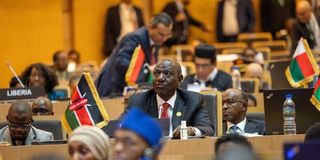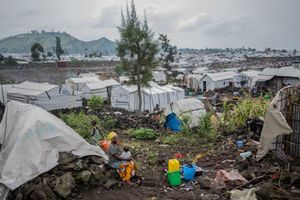
President William Ruto delivers Reports on Peace and Security and AU institutional reforms as the AU Champion for Institutional Reforms at the 38th African Union Ordinary Assembly in Addis Ababa, Ethiopia, on February 16, 2025.
Africa has seen more than its fair share of brutality over the centuries.
Perpetrated by various militia and armed groups, the continent has suffered the mass butchery of the most innocent civilians, extreme torture and wanton rape of men, women and children, ethnic cleansing and genocide and brutality at scales rarely witnessed anywhere else.
Africa has seen Joseph Kony’s Lord’s Resistance Army in Uganda and the Central Africa Republic and its abduction of tens of thousands of children who were forced to bear arms, extreme mutilations such as the cutting of ears, lips and mouths of ordinary folk and extreme brutality meted out on entire villages in the name of a sick view of Christianity which made sense only to Kony.
Africa has been afflicted, in Nigeria and the Lake Chad basin, by the plague of Boko Haram and the Islamic State in West Africa Province whose campaign of terror used child bombers and mass abduction of schoolgirls, their specialty being to specifically target women and children to wreak havoc on frightened populations.
Boko Haram became infamous for the kidnapping of hundreds of schoolchildren in Chibok and the Baga massacre in which more than 2,000 people were killed.
Away from the glare, deep in the forests of the Congo and Uganda are pests like the Allied Democratic Forces (ADF) led by people you probably never heard of with deceptively phonetic names, like Jamil Mukulu and Seka Musa Baluku, but immersed in lakes of blood from the massacre of civilians, suicide bombings, extremist violence and forced recruitment of children soldiers.
Hell, African has even seen the blood-thirsty Al-Shabaab whose heathen preferred military strategy is the spilling of innocent blood in the name of a God rightfully identified by true believers as the most merciful and the most benevolent.
Africa has even felt the sting of Yevgeny Prigozhin’s Wagner Group which has scarred many parts of Africa; abused Africans’ human rights, massacred civilians in Mali, Libya and Central African Republic and systematically tortured, raped and executed its way through the continent.
But Africa has not seen anything like the Janjaweed – literally “devils on horseback” - of Darfur whose use of systematic rape and sexual violence as a weapon of war, the massacre of more than 300,000 people and the displacement of 2.7 million innocent civilians has been condemned and resulted in indictments by the International Criminal Court.
The Janjaweed are fuelled by racism and hatred of non-Arab Africans and a propensity for and glorification of violence rarely equalled.
Darfur is a region of Sudan bordering Libya to the North, Chad to the East, the Central African Republic and South Sudan to the South.
It is an ancient badland and a vicious place where black Africans and Arabised Africans meet.
In terms of context, in lawless Libya, slave markets have opened. There are slave markets in Tripoli, according to news reports, and Sabha in the south.
These are markets where people like us, today, are traded like bananas and used like tractors or jembes in people’s shambas. This is the depth of racism that you will find in those communities.
In the 2000s, after suffering racist policies of the Sudanese government which marginalised and under-developed their region for decades, Darfurians rose against Khartoum.
The rest of the country was being developed, but they had nothing in their dry land. Sudan Liberation Army (SLA) and the Justice and Equality Movement (JEM), emerged in Darfur in 2003, mainly formed by non-Arab Darfurians who demanded greater representation, development, and an end to policies which discriminated against them.
The government of Gen Omar al-Bashir, an evil man, supported and developed Arab militias and deployed them to suppress the rebellious Africans.
They did so by committing atrocities and crimes against humanity: killings on a massive scale, rape and the uprooting of millions from their homes.
In 2013, Mr al-Bashir gave the Janjaweed a new dress; he formalised them into a military force to fight rebels in Darfur, and two other provinces of Sudan; the Janjaweed became a government-controlled paramilitary force.
Its leaders were Mohamed Hamdan Dagalo, popularly known as Hemedti and his brother, Abdul Rahim Hamdan Dagalo, who is the second in command.
Under their leadership, RSF has become a strong force which has fought locally within Sudan and as a mercenary army in Yemen, with some level of success.
The current civil war in Sudan, which has destroyed a previously promising nation, is a fight for the control of Sudan between the former Janjaweeds and the Khartoum elite that has ruled Sudan for many years.
Supporting RSF carries some risk for any country, especially one in good standing with the United States, the United Nations and the European Union given the indictments by the International Criminal Court of people associated with the activities of the RSF and its predecessor, the Janjaweed, such as Mr al-Bashir.
The paramilitary force would also be a threat to the reputation and image of any nation that presents itself as a good-faith peacemaker in Africa.
RSF is an invasive, insurgent and destabilising force wherever it operates, supporting extremist militia not just in Sudan but neighbouring Central Africa Republic and Libya.
The entry of RSF into any dynamic likely causes jitters between neighbours, especially those seeking peace and stability in Sudan.
Kenya has, unwisely, grasped the hairy hand of the devil.








